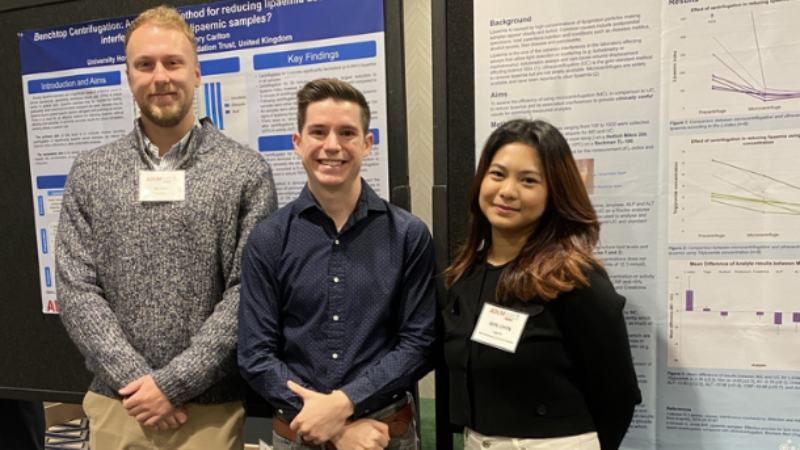
Healthcare Science colleagues have attended the Association for Diagnostics & Lab Medicine (ADLM) laboratory medicine conference in Philadelphia, USA, to present their scientific work which investigates the methods of reducing lipaemia.
Lipaemia is the presence of high fatty particles, and if found in patients’ blood samples can interfere with various types of instruments in the lab and give inaccurate results.
Win Chyn Laguio, Clinical Biochemist Trainee, James Hall, Biomedical Scientist and Dr Henry Carlton presented their work on the metabolic disorder at the ADLM which is a global scientific society dedicated to clinical laboratory science and its application to healthcare.
Win said: “As a scientist trainee, attending conferences are important for me to see what other scientists and labs are doing to help improve current practices, as well as further improving my skills and knowledge. It was an amazing opportunity to present and share the work we do in the labs and representing the NHS.
“This was an amazing opportunity which could not have happened without the help of our supervisors, Kate Shipman, Consultant Chemical Pathologist, Kade Flowers, Principal Clinical Scientist, the Trust’s Clinical Education Team and the support of our labs for letting us carry out these projects.”
The trio also submitted two summary papers on the topic for the conference which were both successfully accepted and will be published in the ‘Journal of Applied Laboratory Medicine.’
Attending the conference also allowed the group to be involved in various discussions and workshops which highlighted tools and practises to minimise errors in the lab, reduce turnaround times, increase specimen quality, and improve patient care.
UHSussex recently released our new Research and Innovation Strategy which sets out our five-year ambitions for healthcare research and innovation within the Trust and for the people of Sussex. This is in support of our vision of providing excellent care, every time for all our patients.
The strategy will empower our colleagues to build research and innovation into their careers and get them more active in research.